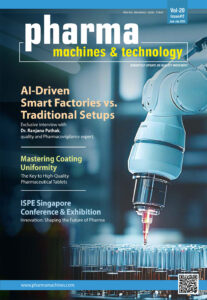 Dear Pharma Pals,
Dear Pharma Pals,
Al-driven smart pharmaceutical factories require substantial investment. Do you think the cost justifies the potential benefits?
Dr. Ranjana Pathak, who oversees Lupin’s global quality and Pharmacovigilance, has this to say in an exclusive interview given to Pharma Machines & Technology:
“This is a pharma executive’s dream, to be fully automated and digitized plus digitalized with all the bells and whistles in the shop floor and labs. In many of our parlance today it is referred to “smart factories and smart labs”. We know most of the problems arise because someone did not do something in time, etc etc… We have a fancy heading/banner for these errors and all of this is couched under Human Error. If investigated further we find that these errors did not occur due to the person (operator or analyst), it was either inherent in the process or the test method. The process may not have delineated all steps clearly, or may not have been practical, ergonomically difficult to execute, or simply not written in sufficient detail… this list is long. With a Smart Factory, all processes would be automated, chances of error become minimal. It becomes a button or click away.”
Yes, the cost of Al-driven smart pharmaceutical factories can be justified by their potential benefits, especially when viewed over the long term. If the pharmaceutical company has the vision, scale, and capital, investing in Al- driven smart factories is not just justified – it’s strategic.
Read the exclusive in this issue on Al-driven smart factories vs. traditional setups.
Harjit Singh Dhaul
Publisher & Editor
Exclusive
Exclusive interview with Dr. Ranjana Pathak, who oversees Lupin’s global quality and Pharmacovigilance.
Articles
The Key to High-Quality Pharmaceutical Tablets
Event
Shaping the Future of Pharma
Infocus
Optima group invests in expansion of its site in Pune
Previews
South Asia’s Premier Refrigeration & Cold-Chain Exhibition
Reviews
Road Shows in Mumbai, Ahmedabad




